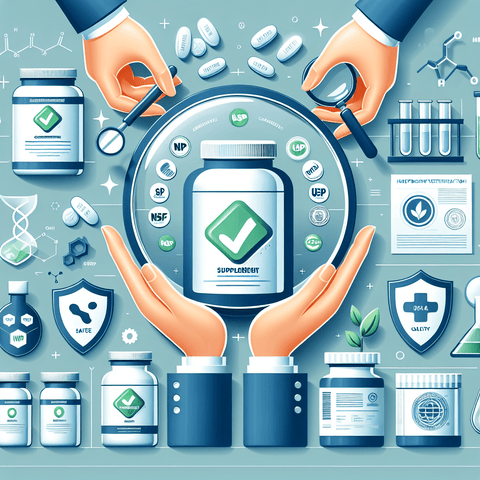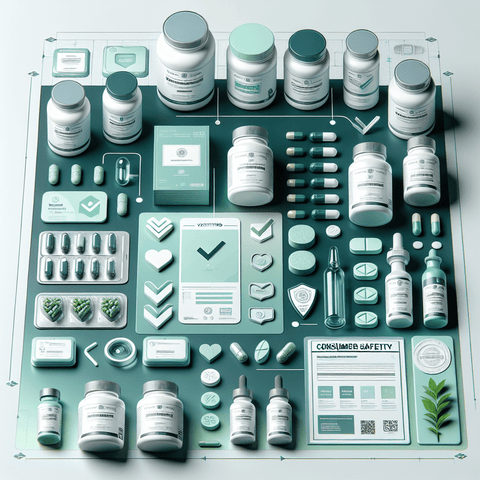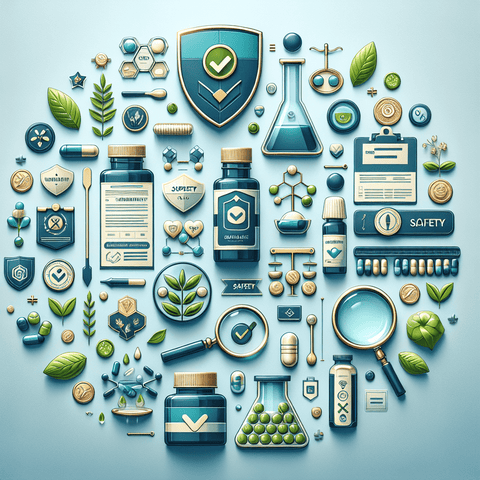Introduction
In today’s health-conscious world, nutritional supplements have become an integral part of many individuals’ daily routines. From boosting immune health and enhancing athletic performance to correcting nutritional deficiencies, supplements offer a convenient way to support overall well-being. However, with the expanding supplement market comes a critical need for assurance that these products are safe, effective, and accurately labeled. Consumers are increasingly aware that not all supplements are created equal, and that pitfalls such as contamination, mislabeling, and adulteration can undermine health goals or, worse, pose safety threats.
The proliferation of supplement brands and products has underscored the importance of rigorous quality assurance practices such as third-party testing. Third-party verifying organizations provide an unbiased layer of scrutiny, helping consumers distinguish between reliable and questionable products. As supplement use continues to grow, understanding the role of third-party testing becomes essential for making informed health choices. This blog delves into how third-party tested supplements contribute to safe and effective nutrition, explaining quality assurance processes, verification methods, and tips for selecting trustworthy brands to optimize health with confidence.
Third-party Tested Supplements: Ensuring Integrity in Nutritional Products
Third-party testing refers to the process where independent organizations evaluate dietary supplements for quality, safety, and label accuracy. Unlike manufacturer claims, which may sometimes be influenced by marketing purposes or internal quality control, third-party organizations independently verify that the product meets established safety and potency standards. These organizations perform rigorous assessments to ensure that what is stated on the label matches the actual contents, that no harmful contaminants are present, and that the product adheres to applicable regulations.
Third-party testing is vital because it provides an objective validation of supplement quality. Many manufacturers perform their own quality checks, but conflicts of interest can occur, compromising the integrity of the results. Independent laboratories and organizations act as impartial arbiters, applying standardized testing protocols to verify label claims. These organizations assess factors such as ingredient potency, purity levels, presence of contaminants like heavy metals or pesticides, and the absence of undeclared substances. The result is a certification or seal of approval that signals trustworthiness, giving consumers peace of mind.
Choosing third-party tested supplements is advantageous for several reasons. First, it helps ensure safety — products that undergo such scrutiny are less likely to contain harmful substances. Second, it bolsters efficacy — verified potency ensures that consumers receive the intended nutritional benefits. Lastly, it offers transparency, allowing consumers to make informed decisions based on independent assessments. As health-minded individuals seek reliable dietary support, third-party testing has become a cornerstone for ensuring integrity in supplement products.
Quality Assurance: Key to Reliable Nutritional Supplements
Quality assurance (QA) is the systematic process of guaranteeing a product's quality throughout its manufacturing and distribution. In the supplement industry, QA encompasses a wide range of practices designed to maintain high standards, such as sourcing raw materials from reputable suppliers, adhering to manufacturing guidelines, and conducting thorough quality control tests. For consumers, quality assurance means they can trust that their supplements are consistent, contain the ingredients listed, and are free from contaminants or adulterants.
At the core of QA in supplement manufacturing is compliance with good manufacturing practices (cGMP), which establish strict protocols for production, handling, and packaging. cGMP standards ensure that each batch of supplements maintains consistent potency and purity. Supplement manufacturers often implement quality control measures like batch testing, raw material verification, and stability testing to maintain product integrity. These processes help identify deviations early, preventing substandard products from reaching consumers.
Additionally, quality assurance acts as a safeguard against contamination, ensuring products are free from harmful substances such as heavy metals, bacteria, molds, or residual chemicals. Mislabeled or adulterated supplements not only fail to deliver promised benefits but can also pose health risks. By prioritizing quality assurance, companies reduce such risks, foster consumer confidence, and support transparency in their manufacturing processes. As consumers, understanding and seeking out products with established QA procedures can significantly elevate the safety and efficacy of your supplement routine.
Supplement Verification: Confirming Authenticity and Composition
Even the most reputable brands can benefit from verification processes to confirm that supplement labels accurately reflect the product’s actual contents. Label verification is essential because mislabeling — whether accidental or deliberate — can lead to ineffective supplementation or, in worst cases, adverse health effects. Consumers need to verify that the supplement they purchase contains the documented ingredients and dosages.
Verification techniques include batch testing, which checks specific lots for identity, potency, and safety, and detailed analysis of ingredients using advanced methods like chromatography or mass spectrometry. Manufacturers often conduct internal verification, but independent lab testing provides an additional layer of confidence. For consumers, performing personal verification can involve choosing products verified by reputable third-party organizations or checking for certification seals on packaging.
Practical tips for consumers include researching brands that provide detailed ingredient lists and third-party certification marks. For example, certification from organizations like NSF International or US Pharmacopeia offers assurances that products have undergone rigorous independent testing. Additionally, purchasing from trusted sources reduces the risk of encountering counterfeit or substandard supplements. Staying informed and vigilant ensures that your supplement intake truly aligns with your health goals and safety standards.
Independent Testing: An Essential Step Toward Supplement Safety
Independent laboratory testing plays a crucial role in safeguarding consumer health by rigorously evaluating supplement safety and potency. These tests, conducted by organizations like NSF International, US Pharmacopeia (USP), and ConsumerLab, are designed to detect contaminants such as heavy metals, bacteria, mold, allergens, and illegal adulterants. Their evaluations extend to verifying ingredient authenticity and ensuring the absence of unapproved substances, which is critical given the variability in raw material quality.
Reputable independent testing organizations employ sophisticated analytical techniques and strict standards to assess supplements. For example, NSF International’s process involves testing for contaminants and verifying label claims, providing a certification mark visible on approved products. Similarly, USP’s standards include testing for active ingredient potency, dissolution, and microbial safety, offering consumers a trusted benchmark for quality. ConsumerLab publishes comprehensive reports, reviewing and rating various supplement products based on their testing results.
Independent testing detection capabilities help uncover problematic products that may contain hazardous contaminants, allergens, or adulterants like anabolic steroids or unlisted pharmaceuticals. This not only protects consumers but also promotes industry accountability. For anyone prioritizing supplement safety, seeking products that have undergone independent evaluation significantly reduces risk and offers a higher level of confidence in your chosen supplement products.
Supplement Safety Standards: Regulations and Best Practices to Protect Consumers
Supplement safety standards are established by various governmental and international bodies to regulate manufacturing practices, ingredient standards, and safety assessments. In the United States, the Food and Drug Administration (FDA) oversees dietary supplement safety by enforcing regulations such as the current Good Manufacturing Practices (cGMP). cGMP guidelines require manufacturers to maintain quality controls, properly label products, and document manufacturing processes.
Worldwide, standards like cGMP, as well as certifications from organizations such as NSF International and USP, set benchmarks for product safety and quality. These standards influence not just compliance but also industry reputation, as adherence demonstrates a commitment to consumer protection. Good safety standards involve rigorous testing for contaminants, proper labeling, traceability of ingredients, and comprehensive record-keeping, all aimed at minimizing risks associated with supplement use.
For consumers, understanding that a product adheres to recognized safety standards effectively filters out low-quality options. Choosing supplements from brands that follow best practices and regulatory guidelines ensures that products are manufactured under controlled, transparent conditions. It reinforces the importance of transparency, quality control, and accountability, making safety a shared responsibility between manufacturers and consumers.
Trusted Supplement Brands: Choosing Companies Committed to Transparency and Quality
Opting for reputable supplement brands is one of the most effective strategies to ensure safety and efficacy. Key criteria include transparency in labeling, third-party testing accreditation, positive consumer reviews, and a clear commitment to high manufacturing standards. Transparency entails providing detailed ingredient lists, sourcing information, and documentation of third-party certifications. Brands that openly share their testing results and safety protocols foster trust and confidence among consumers.
Some brands stand out specifically because they prioritize rigorous testing and safety. They often carry recognized seals from independent organizations like NSF or US Pharmacopeia, indicating their commitment to quality. Additionally, reviewing consumer ratings and feedback can provide insights into product reliability and effectiveness. For those seeking specific supplements, such as vitamin C for immunity or omega-3s for brain health, choosing established brands offers an extra layer of assurance.
Remember, a reputable brand’s reputation for quality not only reflects their adherence to safety standards but also indicates their dedication to consumer health. When selecting supplements, consider visiting trusted retailers like Topvitamine, which offer curated, verified products with transparent information. In choosing brands committed to integrity, you are actively supporting safer supplement consumption and better health outcomes.
Conclusion
Ensuring that your nutritional supplements are safe, effective, and accurately labeled requires an understanding of several critical factors, primarily third-party testing and quality assurance protocols. These processes serve as essential safeguards that prevent contamination, verify ingredient potency, and uphold labeling accuracy, empowering consumers to make informed health choices. As the supplement market continues to expand, selecting products verified by impartial organizations enhances safety and efficacy, helping you reach your health goals with confidence.
Practical tips for consumers include prioritizing brands that display third-party certification logos, conducting personal label reviews, and purchasing from reputable sources. Remember, knowledge is your best tool in navigating the complex supplement landscape. By being diligent and informed, you can optimize your nutritional intake, support your health, and reduce risks associated with substandard products.
Informed consumers possess the power to influence industry standards and demand safer, higher-quality products. Embrace transparency, verify your supplements, and partner with trusted brands committed to safety — your health deserves it!
Q&A Section
Q1: Why is third-party testing important when choosing supplements?
Third-party testing provides an unbiased verification of supplement quality, safety, and label accuracy. It helps ensure that the product contains the ingredients claimed, is free from harmful contaminants, and meets safety standards. This additional layer of scrutiny protects consumers from potential health risks and enhances confidence in the product’s efficacy.
Q2: How can I verify if a supplement has been tested by an independent organization?
Look for certification seals from reputable organizations such as NSF International, US Pharmacopeia, or ConsumerLab on the product packaging. These seals indicate that the product has undergone rigorous independent testing. Additionally, you can visit the organization’s website to verify certification details or review third-party lab reports if publicly available.
Q3: What regulatory standards should I look for in safe supplement manufacturing?
The primary standards include adherence to cGMP guidelines enforced by the FDA and certifications from recognized independent bodies like NSF or USP. These standards ensure proper manufacturing practices, ingredient verification, contaminant testing, and accurate labeling, all of which contribute to product safety and quality.
Q4: Can I trust all supplements from reputable brands?
While reputable brands are more likely to follow safety and quality protocols, it’s still important to check for third-party certifications, transparent labeling, and recent batch testing. Doing your homework helps ensure that even trusted brands maintain high standards for every product you purchase.
Q5: What should I do if I suspect a supplement is contaminated or mislabeled?
If you suspect a supplement’s safety or accuracy, stop using the product immediately and consult a healthcare professional. You can also report concerns to regulatory agencies or the certification organization that approved the product. Always choose products that carry third-party certification marks to minimize such risks.
Important Keywords
- Third-party tested supplements
- Supplement safety standards
- Quality assurance in supplements
- Supplement verification
- Independent testing organizations
- Supplement label accuracy
- Contaminant testing
- Trusted supplement brands
- cGMP guidelines
- Supplement transparency



